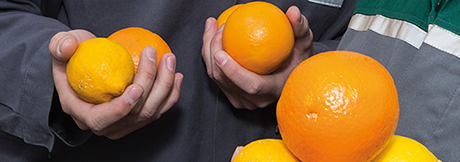Malchin
 One of the world's most modern production facilities for pectin is located in the town of Malchin in the north west of the district of Mecklenburgische Seenplatte. The production and storage grounds cover an area of some 10.7 hectares.
One of the world's most modern production facilities for pectin is located in the town of Malchin in the north west of the district of Mecklenburgische Seenplatte. The production and storage grounds cover an area of some 10.7 hectares.
Production began in January 2002. That production has been under the Cargill banner since 2005. Over 120 dedicated and qualified specialist staff work in production, logistics, laboratory work, and in sales.
Products
Pectin is a natural thickening and stabilizing agent and is most commonly found in citrus fruits, apples, and sugar beets. In households pectin has always been known for the preparation of jams and marmalades. The food industry is one of our main customers. Pectin also has a wide array of uses in drugs and in the cosmetics industry.
Everyday-use products containing pectin:
- Fruit preparations of all kinds
- Fruit juices
- Jams and marmalades
- Yogurts and soy drinks
- Gelatin-free confectionery
- Fillings for pastries and baked goods
History of the location
- Groundbreaking on October 4, 2000
- Machine completion on October 22, 2001
- Start of production in January 2002
- Handover to Cargill in May 2005
- Various optimizations from 2006–2009
- ISO 9001:2000 certification in July 2008
Decoration of "Entrepreneur of the Year 2013"
Exceptional examples of entrepreneurship in the German federal state of Mecklenburg-Western Pomerania are rewarded with the "Entrepreneur of the Year 2013” prize.
The prize was awarded for the sixth time. A total of 105 recommendations were submitted during the course of the year.
Awards were given in three categories:
- Entrepreneurial Personality of the Year
- Business Development
- Securing Skilled Workers and Being Family Friendly
We were honored in the "Securing Skilled Workers and Being Family Friendly” category. We were in competition with 25 other candidates.
"Companies wanting to tie skilled workers down over the long term must create appropriate incentives to stay and show prospects for development. Cargill has already delivered in this regard," said economy minister Harry Glawe, acknowledging the company's commitment. Furthermore, he praised Cargill's program of qualified training and further development for its 115 members of staff.
Why we get involved locally – Corporate responsibility
At Cargill we see our responsibility in the totality of our work and the influence which we have on the people in our immediate neighborhood. On this basis we get involved in various ways at the Malchin location, especially on matters of the environment, nutrition, educating and encouraging children and young people, and supporting people in need.
Examples of our involvement:
- Environmental projects with the "Siegfried Marcus Schule" school in Malchin – Planting a forest
- Malchin kayaking club: Procurement of canoes and financial donations to youth camps.
- Malchin volunteer fire department: Financial support for the youth camp; sponsoring transport vehicles
- Town library: Annual passes for elementary school children
- Workers' Welfare Association housing group: Supporting leisure activities and organizing holidays
- Internship and cooperation agreement with the Siegfried Marcus junior high school
Contact
Cargill Deutschland GmbH
An der Mühlentorweide 1
17139 Malchin
Germany
Tel.: +49 (0)39942 39−0
Fax: +49 (0)39942 39-239
Resource conservation in Malchin
Our main product, pectin, produces 75% so-called "waste materials" which first have to be disposed of at the start of production in Malchin. Due to this imbalance in the ratio of product which can actually be made use of, the "Waste to Value" campaign arose as a result of clever consideration and an idea-finding process in which the entire workforce was involved. Interesting job areas were developed from the question: How can residue material be practically reprocessed and commercially successfully marketed?
The sale of by-products to biogas plants for converting into power was the most successful suggestion. Today the factory in Malchin sells over 20,000 metric tons to biogas plants. Another co-product from pectin production is oil-containing lemon pips, which can be used in the cosmetics and and aromatherapy industries. At the Malchin plant, the motto goes: "Nothing is waste if it still contains something of value."
